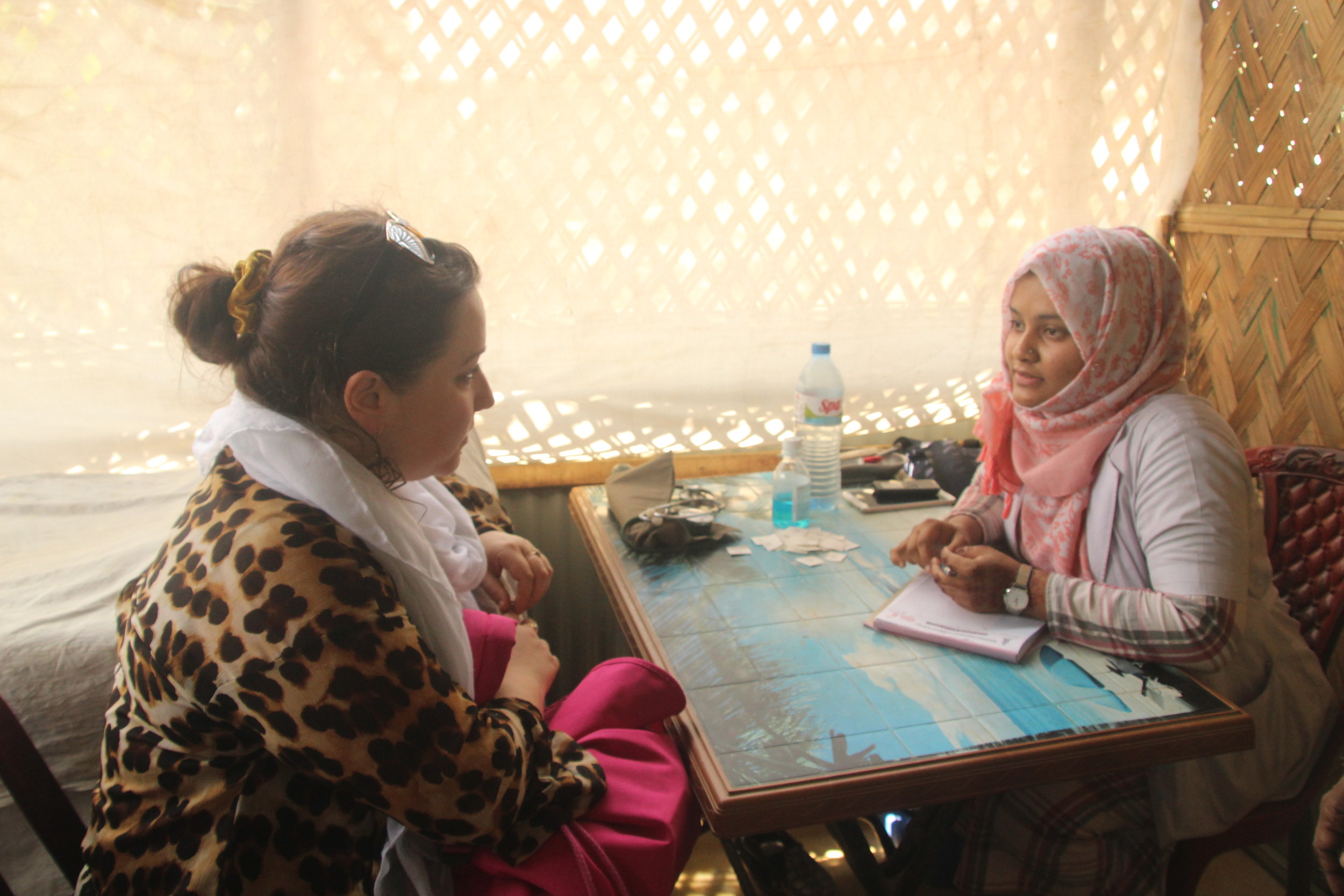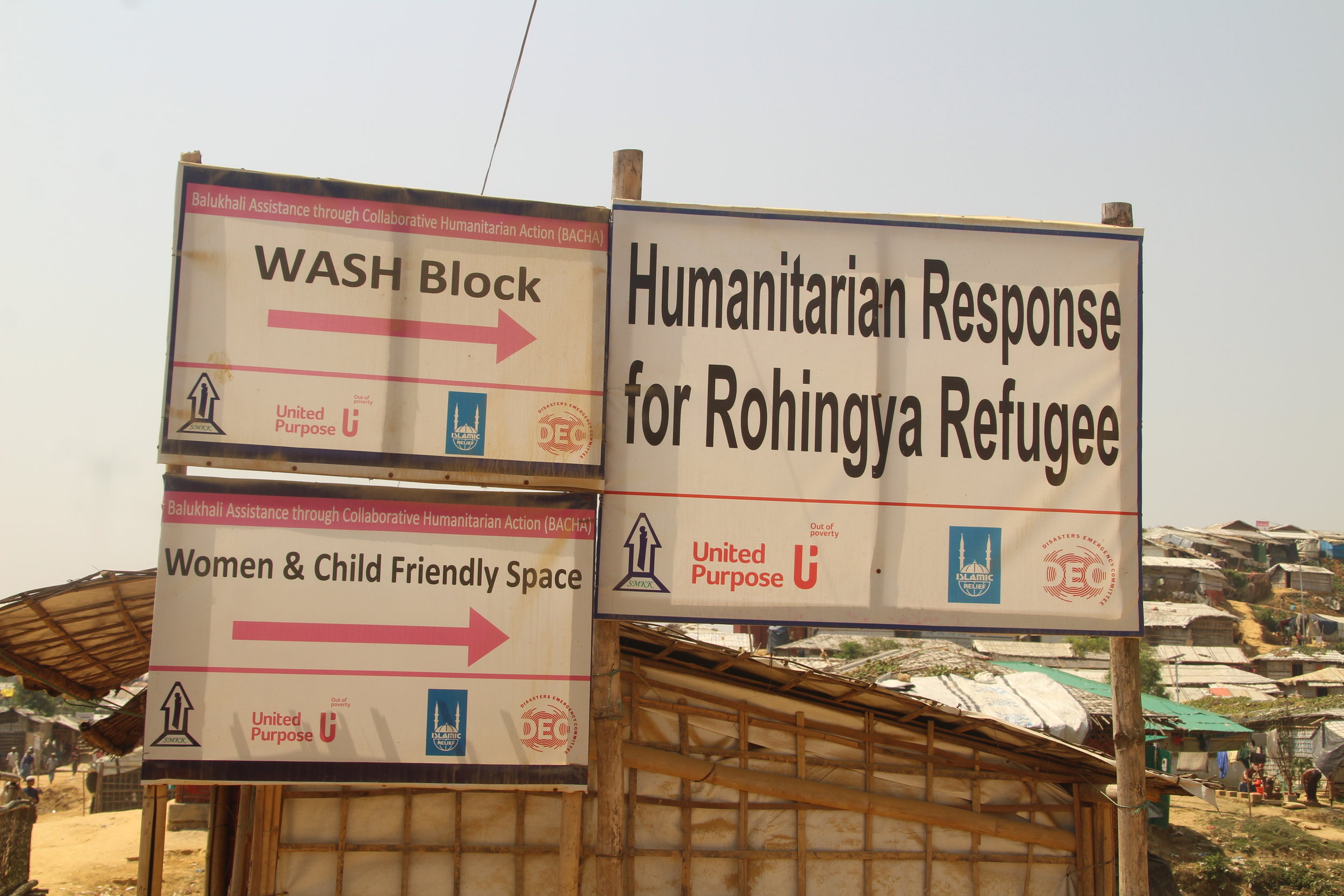This year I had the privilege to visit Bangladesh, a beautiful country which gave me the warmest of welcomes. But also a country facing considerable challenges in terms of poverty - with 63 million people living below the poverty line, malnutrition and stunting common in children, and high maternal mortality rates amongst mothers. That said, the strides the country has made to address these issues is impressive - the population living below the national poverty line dropped to 24.3% in 2016 from 31.5% in 2010. No doubt this reflects their big ambition to move the country from developing to developed by 2041.
United Purpose has been working in the country, supporting these efforts, for the last 25 years. A wide range of development work is carried out across the whole country, for instance we help improve maternal and childhood nutrition, we help women become independent business owners, we help farmers be more resilient to climate change – and more recently we have run part of the Rohingya refugee camp in Cox’s Bazar. We don’t normally do humanitarian aid but when the Rohingya crisis peaked in the summer of 2017, as we were already working in the region, and trusted by Government and local communities, it was natural we would respond.
I witnessed what it meant for nearly a million displaced people to live in 2.5 square miles of steep, dusty hills prone to cyclones. Busy, smelly and dangerous. The soil is loose due to the recent deforestation and I did not feel optimistic that the thousands of bamboo/tarpaulin huts that filled the sky line from all directions would survive the upcoming monsoon season. Although it was heartening to learn United Purpose had trained over 100 Disaster Risk Reduction volunteers, essentially people from the community who will co-ordinate efforts with their neighbours to reduce the damage of the inevitable bad weather and likely floods. And had already strengthened over 500 huts with more planned to be strengthened in the future.
While food is rationed to 1400 calories per adult, it is provided without fail. As is the equipment needed to cook. United Purpose has so far distributed eco-friendly stoves to 1500 families, 8000 water jars and specific equipment to 100 people with disabilities.
There are toilets and water pumps – not many but enough. United Purpose alone has dug 66 deep tube wells, and set water pipeline networks benefiting over 6000 people. In addition, over 8000 households have received hygiene kits which include essentials such soap, sanitary napkins, towels.
As you might expect the children were delightful, seemingly oblivious to their plight, they played in the extreme heat, amongst the debris and dirt. But the women were a different matter. They were sombre. There are numerous accounts of how the Myanmar army used rape as a weapon of terror. Systematic gang rapes in some instances. Reports say around four thousand babies were born around 9 months after the army attacked. Many born to mothers who were already physically and emotionally traumatised, and these births risked them being ostracised from their conservative communities. There are also widespread accounts of the slaying of children in front of their parents. Another deliberate act to cause terror. The stories are the darkest that humanity has to offer.
United Purpose has established 25 communal areas to help these women and children – called Women and Child Friendly Spaces. They are safe spaces where the children come to learn in the morning. There are toys, drawing books, coloured pens – standard items you’d see in schools across the world where learning is encouraged through play and fun. The women gather there in the afternoons. They come to the spaces to attend workshops on nutrition, hygiene, gender based violence, and family planning. And to simply come together, gaining respite from the harshness of camp life. Staff look out for those expressing PTSD and refer them to counselling. To date, these centres have helped 1250 women and children.
The women who attend are also encouraged to seek medical care for themselves and their families from our two healthcare centres. These clinics are staffed by 2 doctors, 4 healthcare workers and 4 paramedics, and see 80 to 90 patients a day. A range of primary care needs are dealt with for free, for instance chicken pox has been rife in the camps. Family planning is often a key topic for women. The Rohingya traditionally don’t use family planning and the number of children per family often reach double digits, but here at the camps the religious leaders, and the husbands, have seemingly accepted it as necessary. One Rohingya women said to me “my husband now says yes to it. I go to the health centre every few weeks. It’s the right decision, this is not a place for babies”.
My colleague, Masud Rana, Programme Coordinator of UP Bangladesh and lead on the Rohingya work told me “United Purpose is making a real difference to the lives of the people in the camp, especially the women and children. They have survived a lot to get here, and yet the camps are difficult places in which to thrive. United Purpose is making sure that they are receiving psychological care, have access to clean water, hygiene products and health facilities.”
As a woman I was allowed to enter the safe spaces to speak with the women, my fellow male travellers were not. Using interpreters that went through four languages I had the briefest, but warmest of conversations. The bottom line was that while the women finally feel physically safe, their situation is not secure and this is a constant source of tension and stress. They were resolute that they wanted me to tell the world their stories. They wanted their situation to be widely known, to encourage a resolution, so they can be settled and safe for the long term.
But sadly there’s no obvious political solution to this crisis. Bangladesh want the Rohingya to return home, but they will not force the issue– safe, voluntary and dignified is the current agreement between the UN and Bangladesh. But it is not safe for them, Myanmar is not offering the Rohingya any solid protection or citizenship rights, and justice for what is generally accepted as ethnic cleansing and a crime against humanity is far off on the horizon. So very few are volunteering to go.
Speaking to local Bangladeshi people there was a lot of sympathy for the Rohingya, and a pride that their Government agreed to take in so many refugees. This is a populous country that is significantly poor itself - their generosity and comradery was moving. But there is a growing feeling of impatience that the situation should not continue for too long. This feeling was directed squarely at the politicians and not at the Rohingya themselves. It made me reflect on how refugees are commonly targeted in the UK, rather than the political situations that created the need for people to flee in the first place.
But it is not all harmonious. The surrounding villages to the camp have been hugely impacted. Where peaceful wooded hills once stood now is a hut-city of 912,000 people. The water table has radically dropped due to the extra use, the deforestation undertaken to make way for the camp means they have lost their source of fuel, the price of a male day labourer has halved due to the increase in supply and the price of vegetables has doubled due to the increase in demand. In addition local children are leaving school earlier than normal due to the abundance of jobs the crisis has created in the region. They are leaving without qualifications, which raises a question what they will do once the crisis is resolved. To me, the frustration and discord of these local people felt completely justified and reasonable.
Tensions are high and this has over spilled into locals disrupting NGOs vehicles entering the camps - United Purpose included. The locals say they need support too and that feeling is not unjust. As a result United Purpose, and other NGOs, are now running projects with these communities. United Purpose has implemented flood defences, improved farm land and created youth lead groups, including a Youth Parliament, that link to the camp to create constructive spaces in which to discuss these issues and find solutions. The situation is calm, our vehicles are no longer targeted, but the potential to flare up is omni-present.
A solution is vital but there is no easy option. Until recently there had been a reluctance to build solid structures in the camps, such as roads and buildings, but the work is now underway. A depressing sign that the camp is here for the long term.
My trip was deeply moving. This is one of the world’s worst humanitarian disasters, the scale is hard to comprehend and the need in the camps is enormous. I felt in awe of the people I met. The Rohingya people have endured so much and yet show so much dignified resilience. These people have been through tremendous trauma and continue to live under great stress. I have met some of the most resilient, impressive, and determined people. My colleagues are working so tirelessly to ensure the camps are safe and supportive environments. They are there for the long haul and I’m proud United Purpose is able to play its part.
I also felt a huge sense of pride for all of United Purpose’s friends and supporters who gave so generously in order for us to continue this vital work. A heartfelt thank you to you all. While the children seemed happy playing in the filth, it’s no place for a child to grow up – together we’re investing in their futures.
Context: United Purpose was able to secure just over half a million pounds for the activities outlined above. Along with saying thank you to friends and supporters, United Purpose is also grateful to the DEC, Penny Appeal and IOM for their continued support and funding.










